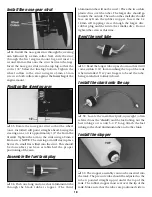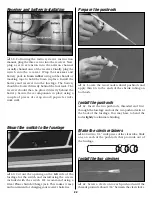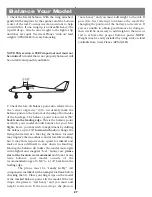
There is one thing that you will need to fly your
SuperStar 60 safely that is not furnished with the kit:
You will need a
qualified
instructor to teach you to fly.
No trainer ever made will let you teach yourself to fly
safely. It can be done, but you would be seriously
risking more than just the model. To find an
instructor, you should join an R/C flying club. If there
is not a club nearby, then you should find an
experienced model pilot who is willing to help you.
The chosen instructor should fly well enough to allow
you to concentrate on your own flying. If you are
worried about your instructor crashing your model,
you will not be able to concentrate on learning to fly.
After you have found an instructor, you should spend
some time just
talking
with him about what you will
be trying to learn. He should inspect the model to be
certain that it is ready to fly. Listen to him and try to
gain by his experience.
Now that you have a good model and an
instructor whom you trust, you can go out and get
started learning to fly. You can expect to be very
nervous at first, and you will make some mistakes.
There will be several instances where the instructor
will prevent you from crashing. This will be unsettling,
but the thing to do is jump right back into flying the
model (after your knees stop shaking, of course). This
is one of the most important things about learning to
fly model airplanes...
you have to fly!
Fly as often as
you can. Be sure to make several flights each time you
go to the flying field, but give yourself time after each
flight to calm down and discuss the flight with your
instructor. Spending some time after each flight
talking about what happened and what you need to
work on to improve your skills will pay off with greater
confidence in your own growing abilities.
CHARGE THE BATTERIES
Follow the battery charging procedures in your radio
instruction manual. You should
always
charge your
transmitter and receiver batteries the night before you
go flying, and at other times as recommended by the
radio manufacturer.
FIND A SAFE PLACE TO FLY
1.
The best place to fly your R/C model is an AMA
(Academy of Model Aeronautics) chartered club field.
Ask your hobby shop dealer if there is such a club in
your area and join. Club fields are set up for R/C flying
which makes your outing safer and more enjoyable.
The AMA can also tell you the name of a club in your
area. We recommend that you join the AMA and a
local club so you can have a safe place to fly and also
have insurance to cover you in case of a flying
accident. (The AMA address is listed at the front of
this instruction book).
If there is not a flying club in your area, you need
to find a large area, free of obstructions, with a
smooth surface that can be used as a runway, and
located at least 6 miles away from any other R/C
airplane operation and away from houses, buildings
and streets. A schoolyard may look inviting but it is
too close to people, power lines and possible radio
interference.
GROUND CHECK THE MODEL
If you are not thoroughly familiar with the operation
of R/C models, ask an experienced modeler to check
to see that you have the radio installed correctly and
that all the control surfaces do what they are
supposed to. The engine operation must also be
checked and the engine “broken in” on the ground by
running the engine for at least two tanks of fuel.
Follow the engine manufacturer’s recommendations
for break-in.
Check to make sure all screws remain
tight, that the hinges are secure and that the prop is
on tight.
RANGE CHECK YOUR RADIO
Check the operation of the radio before every
time you fly. This means that with the transmitter
antenna collapsed and the receiver and transmitter
on, you should be able to walk at least 100 feet away
from the model and still have control. Have someone
help you. Have them stand by your model and, while
you work the controls, tell you what the various
control surfaces are doing.
Repeat this test
with the engine running
at
various speeds with an assistant holding the model. If
the control surfaces are not acting correctly at all
times,
do not fly!
Find and correct the problem first.
28
Preparing To Fly Your SUPERSTAR 60









































